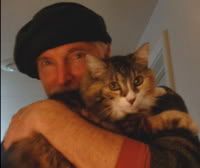Obvious vs, Oblivious (cont. from last blog)

The camera tells a story of distraction and of a frenetic world that doesn’t have time for beauty. In a place of transit, like a train station, a place deemed a mere antecedent to the all-important workday, we are not as open to the flutter of wings from the confused lark flitting about the tunnel columns, nor are we inclined toward the flash of fugues flying around the newsstands, nor toward the sprite that throws off those bright ribbons out into the concrete caverns from his miraculous horsehair wand.
Hey, sorry, but we have places to go… things to do. Can’t be bothered with that right now. Straight ahead. Chop chop.
I think I’ve figured out that old conundrum about “If a tree falls in the forest, will it make a sound?” The answer is “No.” If there is no capacity to process vibration into cognition (by an ear and a brain) then the sensory effect called “sound “ simply does not occur.
Likewise, the answer to the question, “Is it art if no one even stops to acknowledge its existence.” is, again, a resounding “No.”— at least not for those millions constantly checking their watches and Blackberries (and their ears at the door) as they scramble toward their next appointment with destiny.
But the answer is also a resounding “Yes!”— yes, that is, if the artist herself is cognizant and, maybe even, transported by the act of making the art. Unlike a tree falling in the forest, a musician has ears and can be, therefore, a packed arena all unto herself. If musicians didn’t feel this way, they wouldn’t enjoy practicing as much as they do. Sometimes, even for Joshua Bell apparently, only the four-year-old boy being dragged along struggling to get a peek at the man making the magic sound seems capable of acknowledging the remotest possibility of beauty amongst the newstands. Nothing personal, Maestro, ‘twas ever thus.
The true maestro, doesn’t mind. She knows that the rose blooms not for the odd passerby that might stop to take a whiff, it blooms because the earth and the rain and the sun and the mystery of DNA compel it to bloom. Music was meant to be shared but it is the way of the cosmos that the elements of beauty, the remote field of poppies, the melancholy call of the last loon on the lake will always be present even when the eyes (and ears) meant to behold their beauty are not.
Sadly, in these addled, highly conditioned times, such faculties may not be present even among a crowd of thousands. Offering one’s art to the world is not for wimps. Still if I’m to settle for only a couple of patrons on a given day, God and myself will suffice.






